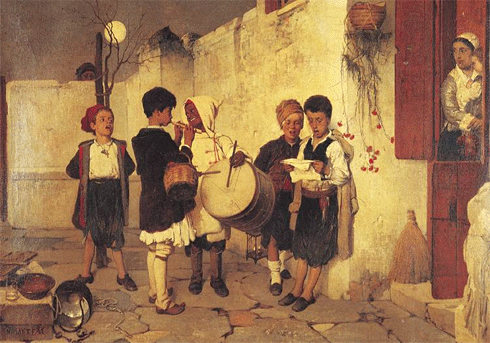
Caroling is part of the Greek Christmas tradition. A carol is called Kalanta or Kalanda in Greek.
Kids go out caroling on Christmas Eve, New Year’s Eve and Epiphany Eve (January 5th). They go door to door singing carols, often bring along triangles to play while singing. The playing is different than playing the triangle as an instrument. They bang the triangle making a repeated sound – not necessarily to the beat of the song. Kids are often given small amounts of money or Christmas sweets for caroling.
At the end of every carol the kids add this verse to wish the landlord prosperity:
Σ’ αυτό το σπίτι που ‘ρθαμε,
πέτρα να μη ραγίσει
κι ο νοικοκύρης του σπιτιού
χρόνια πολλά να ζήσει.In this house we have come
No stone may ever crack
And the landlord
May live for many years.
According to Music Library of Greece, this tradition of caroling goes back to Ancient Greece:
The Greek word Kalanda (carols), derives from the Latin calendae, which means the first day of the month. In Ancient Greece, there were various texts comparable to the contemporary Kalanda, which contained praises for the landlord and good wishes for the prosperity of the household. At that time, children sang carols while carrying boat models in honor of the God Dionyssos. Sometimes they carried branches of olive or laurel upon which they hung their tips and gratuities.
How wonderful that this tradition dates back so far yet kids still partake in it today!
Here are two children singing part of a well-known Greek carol on YouTube. In the video you can hear how they play the triangles. After the video you’ll find the Greek lyrics to the carol, the pronunciation, an English translation and an mp3 of the whole song. Finally at the end of the post, there’s another YouTube version of the carol.
Καλήν εσπέραν άρχοντες,
αν είναι ορισμός σας,
Χριστού τη Θεία γέννηση,
να πω στ’ αρχοντικό σας.
Χριστός γεννάται σήμερον,
εν Βηθλεέμ τη πόλη,
οι ουρανοί αγάλλονται,
χαίρεται η φύσις όλη.Εν τω σπηλαίω τίκτεται,
εν φάτνη των αλόγων,
ο βασιλεύς των ουρανών,
και ποιητής των όλων.
Πλήθος αγγέλων ψάλλουσι,
το Δόξα εν υψίστοις,
και τούτο άξιον εστί,
η των ποιμένων πίστις.Εκ της Περσίας έρχονται
τρεις μάγοι με τα δώρα
άστρο λαμπρό τους οδηγεί
χωρίς να λείψει ώρα.Σ’ αυτό το σπίτι που ‘ρθαμε,
πέτρα να μη ραγίσει
κι ο νοικοκύρης του σπιτιού
χρόνια πολλά να ζήσει.Here’s the pronunciation of the song:
kalin esperan arhontes
an ine orismos sas,
Xristu ti thia yenisi
Na po st’ arhontiko sas
Xristos yenate simeron
en vithleem ti poli
I urani aghalonte
Herete i fistis olien to spileo tiktete
en fatni ton aloghon
o vasilefs ton uranon
ke piitis ton olon
plithos angelon psalusi
to dhoksa en ipsistis
ke tuton aksion esti
I ton pimenon pistisEk tis persias erxonte
tris mayi me ta dora
Astro lambro tus odigi
Xoris na lipsi i oraS’afto to spiti pou’pthame
petra na mi ragisi
ki o nikokiris tu spitiu
Xronia pola na zisiPronunciation Guide
“e” as in “red”
“i” = “ee”
“u” = “oo”
“g” always “g” as in “get”
“s” always “s”
“gh” gargling sound
“h” in “herete” like “ch” in German “ich”
“x” as “ch” in Scottish “loch”
“dh” as in “the”, “this”English Translation
Good evening noblemen
If this is your will,
Christ’s holy birth
May I sing in your noble house
Christ is being born today
In the town of Bethlehem
Heavens rejoice
All of nature is happy.Inside the cave (He) is being born
In a manger for horses
The King of all the universe
The Creator of everything.
A crowd of angels are singing,
“Ossana in excelsis”,
And holly is
The faith of the shepherds.From Persia three magi arrive
With their gifts
A bright star shows them the way
Without any delay.In this house we have come
May no stone ever crack
And the landlord
May live for many years.
Many thanks also to Penelope Karagouni for contributing this song, translating it and transliterating it and for contributing the mp3.
Check out the song page of this kalanta for the score and midi.
Here’s one more YouTube version of this carol…
Happy Holidays!
Mama Lisa
This article was posted on Wednesday, December 2nd, 2009 at 7:34 pm and is filed under Children's Songs, Christmas, Christmas Songs, Countries & Cultures, Greece, Greek, Greek Children's Songs, Greek Christmas Carol, Holiday Songs, Holidays Around the World, Languages. You can follow any responses to this entry through the RSS 2.0 feed. You can skip to the end and leave a response. Pinging is currently not allowed.

























September 10th, 2010 at 1:36 am
I just love greece, I haven’t been there before but hope to some time in the next 2 years.
November 22nd, 2014 at 8:21 pm
Efxaristo and Thank You!
We are using this page to continue the Kalanda tradition as part of our christmas program at our Greek Orthodox Church this season.
The music samples, lyrics in greek, english phonetics and english translation are EXACTLY what I was hoping to find. Thank you, thank you, thank you for helping us keep this tradition alive in Duluth, Minnesota!!!
November 23rd, 2014 at 12:43 am
Thanks for writing! If you’d like to share a recording of your church members singing this song, we’d love to post it! Best wishes, Lisa